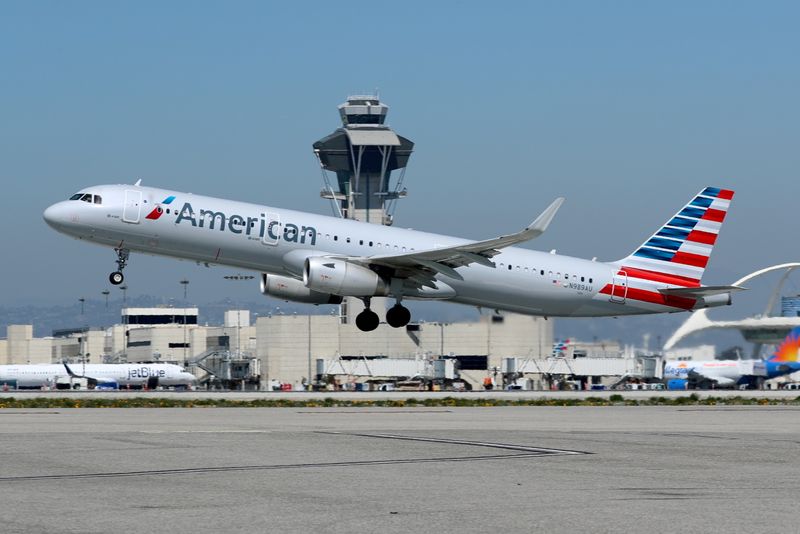By Rajesh Kumar Singh
CHICAGO (Reuters) - A spate of high-profile flight cancellations has put a spotlight on worker shortages at U.S. airlines, triggering warnings of new delays over the holiday period as airlines scramble for staff.
It is a dramatic shift for an industry that was grappling with surplus labor as coronavirus hammered air travel just a year ago, and is the latest evidence of a widening labor crunch.
As demand in the United States roars back, carriers are struggling to keep up. The challenge is especially pronounced at American Airlines (NASDAQ:AAL) and Southwest Airlines (NYSE:LUV), which have been among the most active in adding seats to meet demand.
American canceled hundreds of flights last weekend, citing weather and staffing. It faced similar turmoil over the summer.
Southwest last month suffered an operational meltdown that resulted in around 2,000 cancellations and cost it $75 million. Similar factors in August forced Spirit Airlines (NYSE:SAVE) Inc to cancel 2,800 flights.
Days ahead of the late-November Thanksgiving travel rush, airlines are scrambling to avoid a repeat.
Meanwhile, they face a surge in holiday bookings amid declining COVID-19 cases and rising vaccinations. Southwest said last month ticket sales for November and December were in line with 2019 pre-crisis levels.
Rising demand and labor shortages have left airlines more vulnerable to bad weather, which frequently mars end-year holiday travel. Analysts say that could mean more travel disruption.
"If there's any weather involved, you can expect flight cancellations," said Cowen and Co analyst Helane Becker.
SCRAMBLING FOR WORKERS
In a staff memo last week, American said it expects to have 4,000 new employees in the current quarter. It is also recalling nearly 1,800 flight attendants from long-term leave.
Southwest aims to hire 5,000 employees by year-end.
The rush to hire in a tight labor market risks driving up costs at a time when soaring jet fuel prices are squeezing profits.
Southwest is offering hiring referral bonuses to employees and has raised its minimum wage to $15 an hour. Even then, it says applicant rates are below pre-pandemic levels.
"The competition for the talent and for really good talent is even tighter," said Greg Muccio, director of talent acquisition at Southwest. "A lot of folks ... are looking for a lot of flexibility."
In the interim, both Southwest and Spirit have cut flights to prevent further outages.
Unions blame airlines for poor planning, which they say resulted in fatigue and frustration and made carriers susceptible to such disruptions.
American's pilot union said last month it planned to picket hubs to protest work rotas, fatigue and scarce accommodation.
"We're very concerned that management is stuffing the holiday turkey with uncertainty for the upcoming holiday travel period," said Dennis Tajer, spokesman for the Allied Pilots Association, which represents pilots at American.
To be sure, not all airlines are feeling the same pressures. United Airlines and Delta Air Lines (NYSE:DAL) have, thus far, largely avoided some of the turmoil.
Both are flying fewer flights than rivals. United also struck a deal to keep all its pilots flying last year in exchange for reduced work hours and lower pay.
United and Delta restored just over 70% of 2019 capacity in the quarter through September. In comparison, Southwest ramped up its capacity to more than 98% of 2019 levels and American flew 80% of its pre-pandemic capacity.
Industry experts say United and Delta have been partially insulated from the labor squeeze by networks more focused on international markets, where demand remains relatively weak.
SHORTAGES DESPITE BAILOUTS
But recent congestion has triggered broader questions over decisions by some airlines to slash headcount despite receiving $54 billion in federal aid to help cover payroll expenses.
Senator Maria Cantwell, a Democrat, sent letters in July to the heads of six airlines including American, Delta, Southwest and JetBlue Airways (NASDAQ:JBLU) to demand explanations of worker shortages after billions in pandemic bailouts. Cantwell said at best each airline "poorly managed" the situation and at worst let taxpayers down.
While their responses to the letters have not been made public yet, airlines have said that the bailouts saved thousands of jobs, prevented bankruptcy and put them in a position to support the economy's recovery from the pandemic.
Industry experts say federal aid did help carriers retain workers, but problems started when the payroll program ran out of funds. With no clarity on funding and travel demand still weak, airlines asked workers to take unpaid time off or retire early.
"Had they retained 100% of their workers, they would have required more cash," said Cowen's Becker.
Airlines resumed hiring and bringing back pilots this spring as dipping COVID-19 cases brought passengers back.
U.S. air transportation employment in September was more than 12% below its pre-pandemic peak. By contrast, employment at restaurants and bars, struck equally hard by pandemic lockdowns, is just 7.6% below its peak before the COVID-19 outbreak.
Executives acknowledge a coronavirus-shattered airline industry is naturally more risk-averse, leading to tentativeness by some carriers when the recovery kicked in. Southwest, for example, didn't get moving with its hiring plans before July.
"We were kind of late to the game," said Southwest's Muccio.
